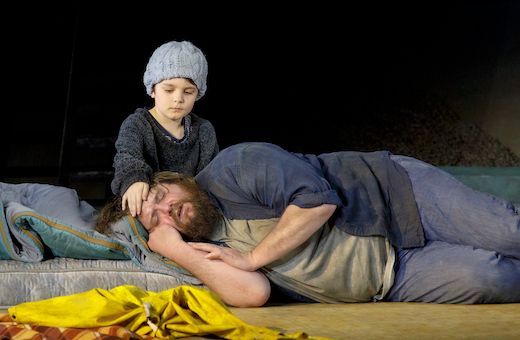At its heart, Peter Grimes is about two capricious things: the power of the sea and the cruelty of the mob. In The Royal Opera’s new production, Sir Mark Elder conducts the orchestra through a brilliant account of Britten’s depiction of the sea and its veering from calm to tempestuous. Deborah Warner stages the seething viciousness of the Borough’s villagers so intensely that you might think that she came from the American Deep South and not from Oxfordshire: never have I seen a lynch mob presented so terrifyingly on an operatic stage.

Warner’s staging is unfussy; she doesn’t do too much because the piece doesn’t need it and what she does is always telling. Michael Levine’s largely abstract sets and props are just enough to give us the strong scent of a present-day fishing village: a sea wall, oilskins, a scattering of nets and plastic crates, a boat suspended high above the stage. Luis F Carvalho’s costumes perfectly overcome one of the trickier bits of Grimes – making sure that the audience knows exactly who is who amongst the large number of minor roles. But it’s the acting and movement around stage that impresses most, whether it’s the bustle in The Boar inn, jocular on the surface but laced with nasty undertones, raucous good cheer of the Act 3 dance, those terrifying vigilante mobs or the frightened rabbit body language of the young apprentice John, made utterly believable by 10-year old Cruz Fitz.
Two giants of British opera, Sir John Tomlinson and Sir Bryn Terfel, dominate the stage whenever they appear, both with huge physical and vocal presences. When Tomlinson runs proceedings as the coroner Swallow, you’re in no doubt that he’s going to be obeyed (he also shows fine comic skills when chasing the skirts of Auntie’s nieces, bringing back memories of his Rosenkavalier performances). As Grimes’ friend Captain Balstrode, Terfel is a true gentle giant, a honeyed voice that exudes a different kind of authority, that of a wise man who has seen it all.
Allan Clayton portrays Grimes as a tortured soul whose violence is more directed at himself than at anyone else, although with a bad tendency to escape in dangerous outbursts. You will hear far more brutal interpretations; in Clayton’s, Grimes violence fades quickly and there is never any possibility that he will overcome his antagonists. In the more introspective moments, such as “What harbour shelters peace”, Clayton displays a truly heart-melting voice of huge nobility (so why, oh why was he made to sing the most beautifully introspective aria of the opera, “Now the Great Bear and Pleiades”, facing away from the audience). Maria Bengtsson sings Ellen Orford with excellent clarity and smoothness, brimming with sympathy, although occasionally submerged by the orchestra.
The smaller roles are all very strong: I’ll single out Jacques Imbrailo as a happy-go-lucky Ned Keene, John Graham-Hall as a bibulous Bob Boles and Rosie Aldridge with a brilliant cameo of the busybody and amateur crime sleuth Mrs Sedley, dressed and made up to the spitting image of Angela Lansbury in Murder, She Wrote.
Elder leads some exceptionally vivid playing from Orchestra of the Royal Opera House, with woodwind and brass on particularly fine form in the orchestral interludes: dawn over the ocean radiated calm, while the storm was whipped up to a devastating frenzy, accompanied by a particularly virtuosic piece of staging as each group of characters stumbles in through the pub doors.
We know that the opera’s sad ending is on its way. From the end of Act 2, there is only one possible outcome, but it’s still chokingly sad, sung by Clayton and Terfel at their very best. Peter Grimes is one of Britten’s masterpieces and one of the great operas of the 20th century. With this production, The Royal Opera are onto a winner. It deserves regular revivals.


